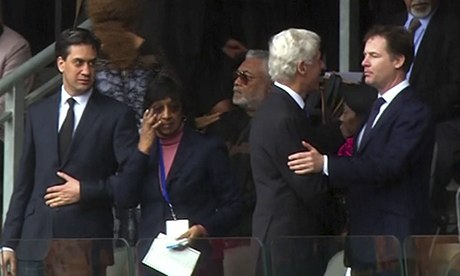
Bill Clinton has recommended a book to Nick Clegg called The End of Power. Clegg himself made the disclosure during his LBC 97.3 phone-in on Thursday. The etiquette of book recommendations is tricky, and itself a kind of power play. The deputy prime minister revealed that his wife, Miriam González Durántez, followed up on Clinton's recommendation by buying the book, thereby showing both respect for Clinton's recommendation and his own personal power to resist.
Clegg is not Clinton's only recommendee. In August, Richard Cohen wrote about the book in the Washington Post (Moisés Naím, its author, is a former editor-in-chief of the Washington Post-owned Foreign Policy magazine) as one "recommended to me by former president Bill Clinton during a brief conversation on the situation in Egypt". All of which suggests that whatever reversals may be happening elsewhere in the world, one thing that still holds power is a Bill Clinton book recommendation. Here are some thoughts from Naím's title, which sets out to "understand what it takes to get power, to keep it, and to lose it", which Clegg may find useful.
What is power?
First of all, it is good to know what power is, particularly if you would like to have more of it, or perhaps to know if you have any in the first place. "Power is the ability to direct or prevent the current or future actions of other groups and individuals." Beware, however: power is not the same as influence. While both are able to "change the behaviour of others … influence seeks to change the perception of the situation, not the situation itself." It is perfectly normal for a politician to want more power. "Power is to politicians what sunlight is to plants."
The distribution of power can change rapidly
For example, power can be dramatically rearranged "with the advent of a talented, disruptive newcomer like Alexander the Great or Steve Jobs", Naím says. It is hard to see Clegg in this light, but perhaps there is still time. Natural disasters are another means of swiftly upsetting the order of things. Does Clegg fit that category? That would seem to be pushing his failings a bit far. A "transforming innovation" is a third means, according to Naím, who cites the invention of the stirrup, the printing press and the integrated circuit. Perhaps Clegg could wrest this role in the UK from James Dyson.
Small powers can be effective
Also, they sound much more modern if you call them "micropowers", suggesting specialism or attentiveness, like "microscope". For Naím, micropowers are antithetical to megaplayers. If you can persuade yourself to see David Cameron as a megaplayer, then Clegg could make a convincing micropower. You might be squinting by now, but that is fine: a natural reaction to micro-anything. Powers of veto, delay, and watering-down fit into the micropower category, Naím says. He has a subchapter which Clegg could find useful, headed "Just Say No".
Sometimes when you've got power, you don't feel powerful
"Politics was always the art of the compromise, but now politics is downright frustrating – sometimes it feels like the art of nothing at all," Naím writes. This may provide comfort.
And when you lose power …
All is not lost. Power is shifting from "leaders to laymen", Naím argues. From Tiririca, the clown who represents the state of São Paulo in the National Congress of Brazil to Twitter activists in Moldova sparking the country's political transition, power resides outside the corridors of power – "a cascading diffusion of power that has put individuals in an unprecedented position … to influence, persuade or constrain 'real' politicians." True, Clegg did tell his party in his Glasgow conference speech that: "We are a party of government now.". But it may be good to know that if everything goes wrong, and ordinary citizenship beckons, there is a chance to take a new and different kind of power.

